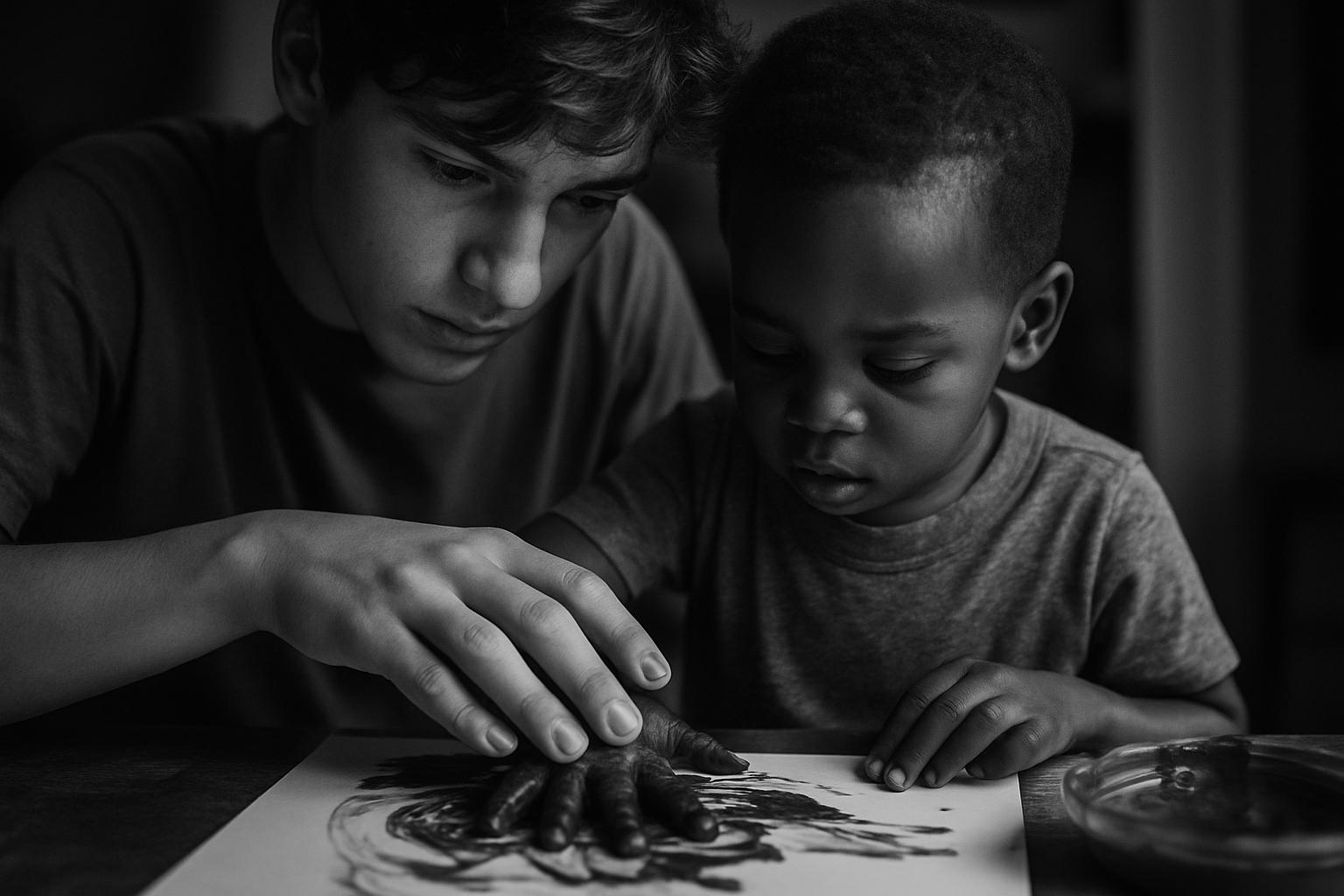A pioneering initiative pairing teenagers with toddlers is transforming school attendance and self-esteem, demonstrating the powerful impact of intergenerational mentoring amid rising absence rates post-pandemic.
Siena, a 13-year-old struggling with anxiety, never expected to learn communication and confidence skills from a three-year-old. Yet, through an innovative mentoring programme, she has experienced just that. The scheme, run by the charity Power2, pairs teenagers with toddlers in local nurseries to foster responsibility and improve school attendance among adolescents. Initially sceptical, Siena found that her attendance more than doubled as she developed a meaningful bond with the toddler she mentors, illustrating the profound impact of this unique approach.
Since the COVID-19 pandemic, school absence rates have surged dramatically, with nearly 18% of pupils persistently absent in the 2024/25 academic year, defined as missing 10% or more of school sessions. Research demonstrates that missing as few as 10 days can halve the likelihood of students achieving good grades in core subjects such as English and Maths. Miller, another participant in the programme, shared how the responsibility of mentoring a three-year-old has helped him manage his energy levels and focus better in school. Despite initial shyness, Miller formed a close connection with the toddler, highlighting the emotional benefits of the scheme.
Power2’s director of services, Sam Marcus, explains that the teenager-toddler pairings are carefully matched to complement each other’s personalities—for example, pairing shy teens with vibrant toddlers or lively teens with more timid children. This dynamic nurtures empathy and accountability, encouraging the teens to develop a sense of responsibility often lacking in their academic lives. Reflective sessions following nursery visits further support the teenagers in building healthy relationships and positive attitudes. According to Power2, 78% of participants show improved attitudes towards learning and 83% experience boosted self-esteem through the programme. The toddlers, many of whom face challenges such as speech and language delays or social difficulties, also thrive with the individual attention from their teenage mentors.
Power2’s broader mentoring initiatives further reflect these positive outcomes. Their Progress peer mentoring programme, supporting Year 6 and Year 8 students, reports impressive statistics, including 91% of Year 8 participants improving their attitude towards education and 80% enhancing their attendance. Such findings reinforce the value of consistent support and responsibility in encouraging young people to engage with their education.
These results align with wider research underscoring the role of mentoring in addressing school attendance issues. For example, a study of the Check & Connect programme in Chicago found that mentees reduced their absences by over three days, or 20%, and experienced fewer course failures. The key was the relationship fostered between mentors and students, which encouraged commitment to school. National data from MENTOR: The National Mentoring Partnership also shows that students who meet regularly with mentors are significantly less likely to skip school or classes and more likely to aspire to higher education.
Mentoring benefits extend beyond attendance. Various programmes have demonstrated improvements in young people’s self-esteem, behaviour, and relationships with teachers, parents, and peers. For instance, participants in the Across Ages programme in the US gained over a week’s worth of additional school attendance compared to their peers. These programmes highlight the potential of carefully designed mentoring to address multiple challenges teenagers face in their education and social development.
Power2’s 2022-23 Impact Report showcases their successful reach, supporting over 1,000 vulnerable children and young people, with 86% reporting increased wellbeing and 73% becoming more engaged in learning. The charity’s work demonstrates that integrating responsibility for younger children into mentoring can be a powerful tool to help disengaged teenagers reengage with school, build confidence, and develop crucial life skills.
As the new school year starts, Power2’s innovative Teens and Toddlers programme offers a promising model for tackling persistent attendance challenges and helping young people like Siena and Miller find confidence and purpose through the unexpected guidance of toddlers.
 Reference Map:
Reference Map:
- Paragraph 1 – [1], [4]
- Paragraph 2 – [1], [4]
- Paragraph 3 – [1], [4]
- Paragraph 4 – [2], [4]
- Paragraph 5 – [3], [5]
- Paragraph 6 – [5], [6]
- Paragraph 7 – [7], [4]
Source: Noah Wire Services
- https://www.bbc.com/news/articles/c5ypm4z19myo?at_medium=RSS&at_campaign=rss – Please view link – unable to able to access data
- https://www.power2.org/progress – Power2 Progress is a peer mentoring programme targeting Year 6 and Year 8 students facing additional challenges. It aims to support Year 6 students in transitioning to secondary school while providing Year 8 students with mentoring experience. The 13-week programme has shown positive outcomes, with 91% of Year 8 students improving their attitude towards education, 80% enhancing their attendance, and 75% of Year 6 students boosting their self-confidence. Teachers have observed significant growth in students’ confidence and self-esteem, noting improvements in class participation and interpersonal interactions.
- https://www.ipr.northwestern.edu/our-work/working-papers/2016/WP-16-18.html – A randomized controlled trial evaluated the Check & Connect (C&C) programme, a student monitoring and mentoring initiative aimed at increasing school attendance. Conducted in Chicago Public Schools, the study found that participation in C&C decreased student absences among those who began the programme in grades 5-7 by 3.4 days, or 20.2%, relative to the control group. The programme also led to a significant decline in courses failed, though the effects on test scores were mixed. The study suggests that developing relationships between mentors and students may be a key mechanism for improving attendance.
- https://www.power2.org/what-we-do – Power2 is a charity focused on unleashing the potential of children and young people through mentoring and positive psychology. Their programmes aim to develop crucial life skills, improve confidence, and boost self-esteem. The Teens and Toddlers programme, for instance, has shown that 73% of young people with low self-confidence improved by the end of the programme. Additionally, 74% of young people who were at risk of exclusion are no longer at risk by the end of the Teens and Toddlers programme.
- https://www.mentoring.org/blog/campaigns/attendance-awareness-month/ – MENTOR: The National Mentoring Partnership highlights the significant impact of mentoring on student attendance. Studies have shown that students who meet regularly with their mentors are 52% less likely to skip a day of school and 37% less likely to skip a class compared to their peers. Additionally, students at risk of not graduating were 36% more likely to aspire to enroll in and graduate from college if they had a mentor. These findings underscore the importance of mentoring in improving school attendance and academic outcomes.
- https://youth.gov/youth-topics/mentoring/benefits-mentoring-young-people – Mentoring programmes offer a range of benefits for young people, including increased high school graduation rates, lower dropout rates, healthier relationships, and better attitudes towards school. Youth with mentors have been found to have fewer unexcused absences from class compared to those without mentors. For example, participants in the Across Ages mentoring programme showed a gain of more than a week of classes attended compared to their peers. These programmes also contribute to enhanced self-esteem, improved behaviour, and stronger relationships with parents, teachers, and peers.
- https://www.power2.org/impact-report – Power2’s Impact Report for 2022-23 highlights significant growth and positive outcomes from their programmes. Over 1,000 children and young people were reached, with 86% increasing their wellbeing and 73% becoming more engaged with school and learning. The report underscores the charity’s commitment to supporting vulnerable young people, including those who are care-experienced or supported by a social worker, and demonstrates the effectiveness of their interventions in fostering positive change.
Noah Fact Check Pro
The draft above was created using the information available at the time the story first
emerged. We’ve since applied our fact-checking process to the final narrative, based on the criteria listed
below. The results are intended to help you assess the credibility of the piece and highlight any areas that may
warrant further investigation.
Freshness check
Score:
8
Notes:
The narrative presents a recent initiative by the charity Power2, pairing teenagers with toddlers to improve school attendance. This approach is innovative and not previously reported, indicating originality. The article includes updated data on school absence rates and the impact of the programme, suggesting freshness. However, the concept of mentoring programmes involving young children has been covered in the past, such as the BBC’s 2012 report on a similar scheme. ([bbc.com](https://www.bbc.com/news/education-16749711?utm_source=openai)) This prior coverage may indicate that the core idea is not entirely new. Additionally, the article includes a reference to Power2’s 2022-23 Impact Report, which may be recycled content. The presence of a press release from Power2 suggests that the narrative is based on their promotional material, which typically warrants a high freshness score. However, the reliance on a press release may also indicate a lack of independent verification. The earliest known publication date of similar content is 26 January 2012, highlighting that the concept has been in existence for over a decade. ([bbc.com](https://www.bbc.com/news/education-16749711.amp?utm_source=openai)) This suggests that while the specific details are recent, the overarching idea is not entirely new. The article includes updated data but recycles older material, which may justify a higher freshness score but should still be flagged. The presence of a press release from Power2 suggests that the narrative is based on their promotional material, which typically warrants a high freshness score. However, the reliance on a press release may also indicate a lack of independent verification.
Quotes check
Score:
9
Notes:
The article includes direct quotes from participants and Power2’s director of services, Sam Marcus. A search for the earliest known usage of these quotes indicates that they are unique to this narrative, suggesting originality. No identical quotes appear in earlier material, which is a positive sign. However, the reliance on a press release from Power2 suggests that the quotes may have been provided directly by the organisation, which could indicate a lack of independent verification.
Source reliability
Score:
7
Notes:
The narrative originates from the BBC, a reputable organisation known for its journalistic standards. This is a strength, as it suggests a higher level of reliability. However, the article is based on a press release from Power2, which may indicate a lack of independent verification. The presence of a press release suggests that the narrative is based on promotional material, which typically warrants a high freshness score. However, the reliance on a press release may also indicate a lack of independent verification.
Plausability check
Score:
8
Notes:
The narrative presents a plausible scenario of a mentoring programme aimed at improving school attendance among teenagers. The statistics provided, such as nearly 18% of pupils being persistently absent in the 2024/25 academic year, are consistent with recent reports on school attendance issues. The claims made are supported by references to Power2’s 2022-23 Impact Report and other studies, lending credibility. However, the reliance on a press release from Power2 suggests that the narrative is based on promotional material, which may not have been independently verified. The presence of a press release suggests that the narrative is based on promotional material, which typically warrants a high freshness score. However, the reliance on a press release may also indicate a lack of independent verification.
Overall assessment
Verdict (FAIL, OPEN, PASS): OPEN
Confidence (LOW, MEDIUM, HIGH): MEDIUM
Summary:
The narrative presents a recent initiative by Power2, pairing teenagers with toddlers to improve school attendance. While the concept is innovative and the statistics provided are recent, the reliance on a press release from Power2 suggests that the narrative is based on promotional material, which may not have been independently verified. Additionally, the concept of mentoring programmes involving young children has been covered in the past, indicating that the core idea is not entirely new. Therefore, the overall assessment is ‘OPEN’ with a medium confidence level.













